Audacity Series - (Part 4)
Repository
https://github.com/audacity/audacity
Introduction
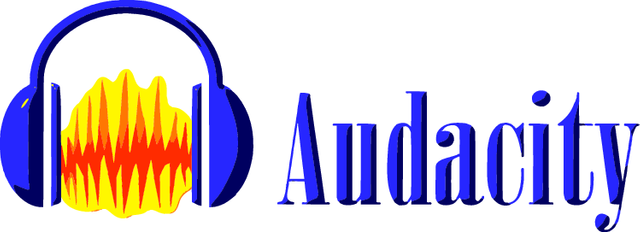
It is not very often that we can see a free and open source software competing with paid proprietary ones. It is even less common seeing this kind of software beating the competition, to the point it is the standard in its field.
Believe it or not, that is what Audacity has become. Chances are your favorite podcast or youtube video had a bit of Audacity work behind it.
And that isn't without a good reason. In this series, I have shown different tools on the software, that together can help professionals do their work. And that is valid for many fields of working, from podcasts to video editing.
If you don't believe it, just check how many effects there are on the stock program:
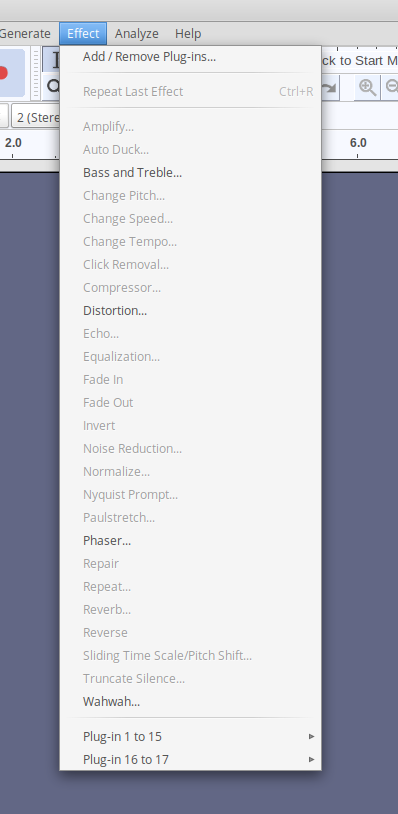
And those are the default effects! I can't and don't use half of them, but if you want, you can add plugins so the software can do even more. That is an advantage not just Audacity has, but most open source programs do.
In this post, let's dive deeper into what makes this the "standard" for many home professionals. We will learn about the history of the software and the "do it yourself" on the internet. We will also see a little bit of the controversies regarding the software, but why that is a good thing.
But what Audacity?
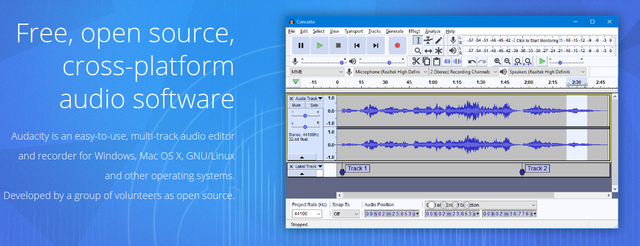
If you haven't been following this series, in short:
Audacity is a free and open source audio editing tool. It has become the standard tool for most freelancers and professionals on the internet. Audacity, though free, comes packed with tons of features.
Actually, Audacity is such a complete and well-thought software that I use it not just for audio editing. Sure, you can't edit video on it, but you can edit the audio from the video!
The advantages of using Audacity instead of the stock audio editor from your video editor is that Audacity has many more features. So much that it can be used for any project that involves sound! Such as:
- Podcasts
- Videos
- Music
- Audiobooks
How did I find and why do I use Audacity
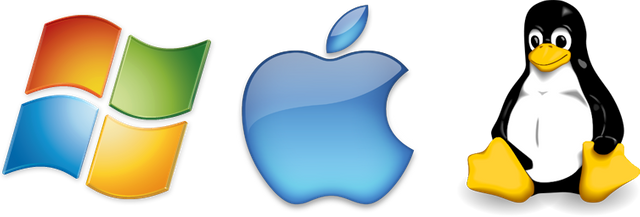
To answer that, first, I need to explain why I, now, use mostly open source software!
Until the middle of last year, I was a full-time Windows user. As a Windows user, I had plenty of software to choose from. However, most of the programs available for Windows are expensive.
Though expensive, Windows users usually don't really care about paying for software. If we have paid a lot of money just to use the operating system, why not spend a few more bucks to be productive, right?
But near the end of last year, I challenged myself to use Linux for 30 days. All of a sudden I deleted my windows and switched to Linux.
When I have finished installing Linux and uninstalling Windows from all of my machines, I realized "wait, how will I get work done?!". So, I began searching for alternatives for those programs, but that are compatible with Linux. I didn't want to pay for Linux software (yes, paid Linux programs do exist) because I thought I'd go back to Windows.
You don't know how much the industry ignores Linux until you use it. After some research, I could replace my video editors, my photo/image editors and everything else.
At the end of the challenge, I have realized two things:
- I didn't miss Windows and Windows programs at all
- The Linux alternatives had a better performance and usability for my use cases
So, I stuck with Linux and it is my main operating system until today.
So, that is the quick story of why I use mostly open source programs. But Audacity is different!
I have been using Audacity since I was a Windows user! Why? Because there is no "alternative" it! This goes to show you that Audacity is the standard!
Most users of free and open source programs are Linux users because we all share a similar story to mine! We have changed from Windows to Linux, and because the big software industry doesn't care about Linux, we had to find alternatives. But for audio editing, it is hard for the competition. Audacity has a great performance, has lots of documentation and tutorials, is easy to learn and has all the features I can think of. Try for your self, search for audio editing software, try to find a competitor that has as many tutorials and user base as Audacity.
If you ask on forums, chats or blogs "what audio editing software tool should I use", not surprisingly, Audacity will be recommended over half of the times.
History
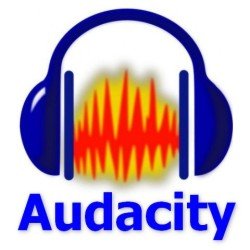
To understand why and how this software became a leader in Audio editing, we need to see its history.
Audacity was created by Dominic Mazzoni together with Roger Dannenberg, and was released in the year 2000, 18 years ago! The timing probably couldn't be better, with the internet growing and online content creation rising fast. So perfectly was the timing, that accordingly to Wikipedia, the first software that allowed people to share and download podcasts was released in 2000 too!

i2Go allowed users to download a series of podcasts to their PCs and MP3s to listen on the go. It is a very fortunate coincidence for the Audacity project. What this timing meant is that users could create high-quality audio series, publish, and get listeners.
Also, between 2000 and 2001 the RSS feeds were introduced, giving more power to the people to start their own podcasts.

From 2000 onwards, self-made internet projects grew exponentially. Blogs and podcasts were on the rise, and Audacity was there to support the early days of content creation. A free, open source and feature-rich program was something people couldn't ignore.
So popular was Audacity that in 2007 and 2009 it won the "Community Choice Award" for "Best Project for Multimedia". It wasn't for no reason, the popularity was on the rise, and the program reached over 70 million downloads on SourceForge in 2011! And in 2018 it exceeded the mark of 60 million downloads on FossHub.
All of that contributed to the popularity, allied with the price tag (free) it became a snowball effect. The more popular Audacity became, the more tutorials were made, more discussions around it were created and more people recommended it. To the point that paid software were left behind in the shadow of this giant open source project.
And that goes back to "why do I use Audacity". I was born in the '90s and I grew up with the internet. I saw the podcasts and "do it yourself" projects turning themselves from a hobby into work for many people. And that is why I, even when I was a Windows user, was also an Audacity user. That was, and still is, the norm, everyone uses Audacity!
Controversies

Life for this project isn't all sunshine and rainbows. In 2008, CNET has rated Audacity "5/5", which is the perfect score. But since then, their rating was lowered to "4/5", because as technology grew, the expectations grew too.
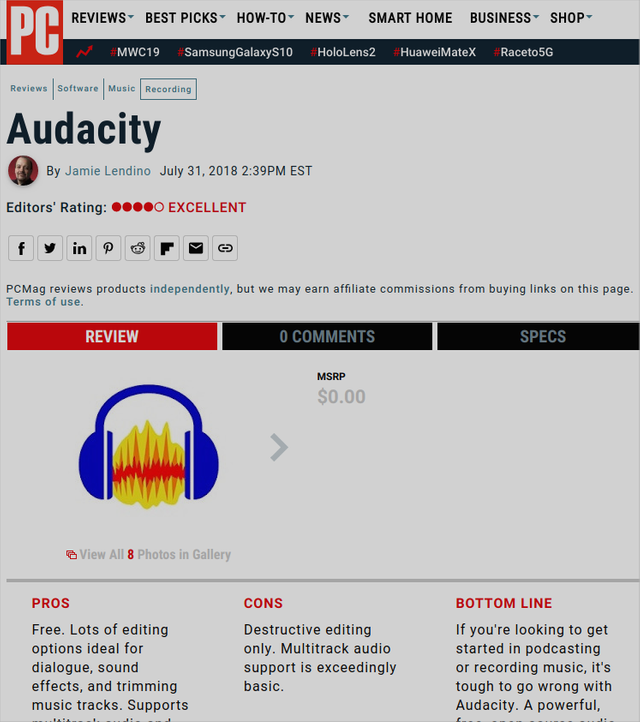
PC Magazine also gave it a 4/5 rating on their most recent review of Audacity.
Though 4/5 is considered "excellent", that illustrate the possibility that the team is lagging behind, and soon enough, a competitor may rise. It is still early, and they have plenty of time and possibly resources to catch up with what professionals expect Audacity to allow them to do.
Also, we need to consider that the lower score on the reviews are due to the fact that the professionals think the software is too simple. Simplicity is actually the reason why I use Audacity to edit everything audio related that I can, and I believe I am not alone on that. So, maybe not receiving a perfect score from high-end professionals might be a good thing?
Resources
CNET review of Audacity:
https://download.cnet.com/Audacity/3000-2170_4-10058117.html
PCMag review of Audacity:
https://www.pcmag.com/review/362572/audacity
Udacity main website:
https://www.audacityteam.org/
Download page:
https://www.audacityteam.org/download/
Tutorials:
https://manual.audacityteam.org/#tutorials
Beneficiaries
This post has as beneficiaries
- @utopian.pay with 5%
- @steempeak with 1%
using the SteemPeak beneficiary tool
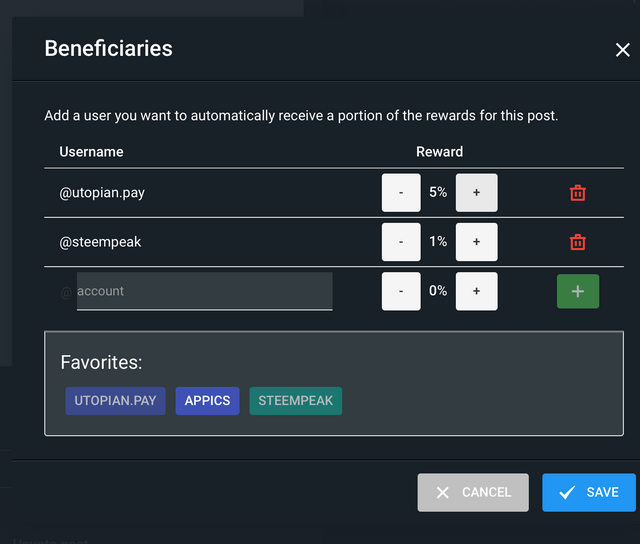
This is another interesting part of your Audacity series. The post is quite extensive. Without a doubt, Audacity is an amazing project. I never knew it has been in existence for close to 2 decades.
I have been reading a lot of your publications, and I think, you have shared the information about how you switched from Window to Linux in one of your posts. Making reference to it isn't bad. However, it'd seem like a repetition of information to your constant readers. Also, it could be perceived as padding of texts.
I spot some improvement in your writing, and that is good. But, you need to improve on how you structure your texts. There are some that are quite unclear.
I'll give an example.
Your contribution has been evaluated according to Utopian policies and guidelines, as well as a predefined set of questions pertaining to the category.
To view those questions and the relevant answers related to your post, click here.
Need help? Chat with us on Discord.
[utopian-moderator]
Hi, thank you for sharing your suggestions. I sincerely appreciate you pointing where I could improve with the quotes. Also, thank you for noticing improvements, I have been reading other peoples posts more and I think may have helped.
Thank you for your review, @tykee! Keep up the good work!
Hi, @igormuba!
You just got a 0.21% upvote from SteemPlus!
To get higher upvotes, earn more SteemPlus Points (SPP). On your Steemit wallet, check your SPP balance and click on "How to earn SPP?" to find out all the ways to earn.
If you're not using SteemPlus yet, please check our last posts in here to see the many ways in which SteemPlus can improve your Steem experience on Steemit and Busy.
Hi @igormuba!
Your post was upvoted by @steem-ua, new Steem dApp, using UserAuthority for algorithmic post curation!
Your post is eligible for our upvote, thanks to our collaboration with @utopian-io!
Feel free to join our @steem-ua Discord server
Hey, @igormuba!
Thanks for contributing on Utopian.
We’re already looking forward to your next contribution!
Get higher incentives and support Utopian.io!
Simply set @utopian.pay as a 5% (or higher) payout beneficiary on your contribution post (via SteemPlus or Steeditor).
Want to chat? Join us on Discord https://discord.gg/h52nFrV.
Vote for Utopian Witness!